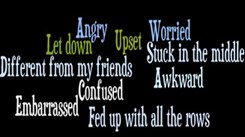I am a Teenager and I am Concerned
If someone is touching you in a way that they shouldn't, or is hitting you or threatening you, then you should get help.
The person doing this might be someone in your family, or someone you know well. You might feel worried about speaking to somebody about what is happening, but it is important that you get help to feel safe.
All children have a right to grow up in a caring and safe environment. All adults have a responsibility to protect children, including parents and carers, family members, friends, neighbours, professionals and members of the public. If you are worried about your safety, you might want to first speak to a friend or a relative to talk things over. This person might be able to help you to talk to someone who will know what to do, such as a social worker, a police officer or a teacher. It's important that you talk to somebody about what is happening.
Children may be hurt in a number of ways, for example;
- Not being kept safe by the people who look after you.
- Being hit or beaten.
- Being very frightened - maybe someone has threatened to hurt you or someone you love. Maybe you have seen bad things happening to your family or friends.
- Living with violence at home.
- Being bullied, in person or over the internet or mobile phone.
- Not getting enough to eat.
- Not having warm enough clothes.
- Living with someone who often gets drunk or who uses drugs.
- Being made to watch 'Adult Only' films, or being touched in ways that make you feel embarrassed or frightened.
If you feel that there is nobody you can talk to, you can call Childline, which is a confidential helpline, to talk over what you can do. Their telephone number is 0800 1111
Do you feel?

Who can help?
Try to tell your parents how you are feeling but if that is difficult then it can be a good idea to talk to someone else:
- a teacher at your school
- the school nurse
- a children's support worker
- social worker
- police officer or youth worker
- It could be a relative, a neighbour or someone who runs a local children's club e.g. Guide/Scouts etc
There are different types of abuse:
- Physical assaults; for example hitting, punching and kicking. Indicators to be aware of may include; bruising or other marks which are unusual or inconsistent with play, burns or bite marks.
- Sexual abuse; for example inappropriate touching, exposure to sexually explicit materials, inappropriate sexual activity. Indicators to be aware of may include; sexualised play or language, a lack of boundaries with other children or adults or sexualised behaviour which is not commensurate with their age. The child may also present as dirty or smelly although this is more often an indicator of neglect.
- Neglect; this occurs where children or young people's basic physical or psychological needs are not being met. This may include parents or carers failing to provide adequate food shelter of clothing, failing to provide medical care and attention or adequate safe care and/or supervision. Indicators may include children present as dirty, hungry, withdrawn or as having persistent health issues which are untreated - such as poor dental health.
- Emotional abuse; this may involve conveying to a child that they are worthless or unloved, scapegoated, blamed. It can also include the placing of inappropriate expectations and/or controls on a child/young person.
If I tell somebody that i'm being abused?


